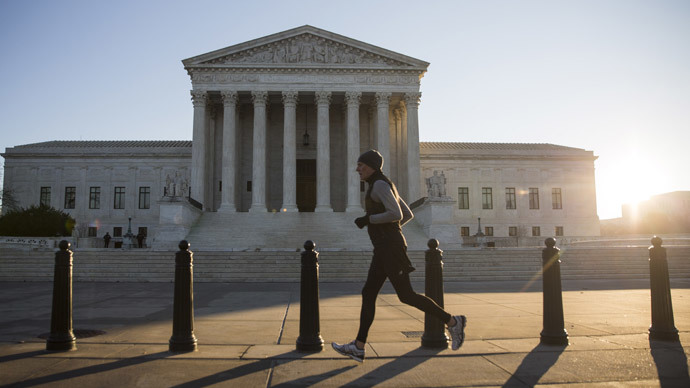Police encounters kill hundreds of disabled Americans every year, ACLU argues

The American Civil Liberties Union filed an amicus brief arguing that hundreds of disabled Americans are killed in police encounters every year. It was filed in support of a mentally ill woman suing police for shooting her five times.
In the case of San Francisco v. Sheehan, Teresa Sheehan argued that police shot her five times even though she was experiencing a “psychiatric emergency.” The US Supreme Court will hear oral arguments in the case on Monday.
Sheehan argued that when police came to her room in a group home in 2008 to take her to a hospital, they violated her Fourth Amendment rights and her rights under the American Disabilities Act (ADA). Sheehan's home aide called police to take her to a hospital for an evaluation after he noticed she had stopped taking her medication, stopped eating and hadn't changed her clothes in a few days.
During the police encounter, Sheehan threatened officers with a knife. The interaction escalated and police ended up shooting her five times. She survived and consequently sued the city. At issue for the nation's highest court is whether and how the ADA applies to interactions between police and people with disabilities.
#TeresaSheehan. A Survivor http://t.co/6HQCYNQPFK
— USuncutMN (@USuncutMN) January 20, 2015
The case comes amid an increasing number of news stories about police officer-involved shootings of people with mental illness, many of whom are people of color. Body camera footage just released showed Jason Harrison, a mentally ill black man in Dallas, Texas, was shot by police after his family called for help and Harrison threatened officers with a screwdriver.
Earlier this month, Los Angeles police killed a homeless black man, Africa, who had told a friend that he had spent ten years in a psychiatric facility. And on January 5, police killed a North Carolina teenager, Keith Vidal, whose family had called for help as he was in a “psychiatric emergency.” He also threatened police with a screwdriver.
READ MORE: Video reveals Dallas cops shooting schizophrenic man holding screwdriver
The ACLU says hundreds of Americans with disabilities die every year in police encounters and many more are seriously injured. But the figures of actual deaths are hard to acquire, as The Death in Custody Reporting Act of 2000 was allowed to expire in 2006 and the Bureau of Justice Statistics collects data on a voluntary basis.
In a review of 51 officer-involved shootings in San Francisco from 2005-2013, however, the news outlet KQED found that 58 percent of the people killed by police – 11 out of 19 cases – had a mental illness. The ACLU argued in its brief that the last Bureau of Statistics report showed half of the 375-500 people killed by police each year in the US have mental health problems, and 700,000 – or a third of the 2.1 million people in jail and prison – are mentally ill.
READ MORE:Naked, unarmed black man shot dead by white metro Atlanta cop
The ACLU argues that “many of these deaths and injuries are needless, the tragic result of police failing to use well-established and effective law enforcement practices that take disability into account.”
The group said that shootings of the mentally ill tend to follow a pattern. Someone calls the police about a person in crisis, the police arrive but the person in crisis fails to immediately respond to police commands because they are in a crisis related to their mental disability. When they don't comply with police commands, an officer starts shouting and draws their weapon. They may surround the person or spray them with mace, escalating the confrontation. In panic, the mentally ill person grabs a nearby object, like a knife, screwdriver, pen or mop. The officer generally fires and the disabled person dies or is injured.
READ MORE:Mentally ill Cleveland woman’s death by police ruled homicide
In a 2012 article in the Portland Press Herald about the trend of mentally ill people being shot in police encounters, it was noted that the cuts in funding for mental illness on a state and federal level is creating a national crisis.
“The mental health care system has been shifting responsibility to law enforcement for some time now,” Kristina Ragosta, lawyer at the Treatment Advocacy Center told the Press Herald. “Police departments are become default first-responders to people in mental health crisis.”
The San Francisco officers who reported to the group home knew Teresa Sheehan was mentally ill and in... http://t.co/TI5QzCaQ3a
— WeRalldoingtime (@WeRalldoingtime) February 17, 2015
Police departments across the country know this but there is a lack of data on police shootings and officers don’t have adequate policies for handling their new responsibilities.
“I think the biggest problem we have in this country is that we have 18,000 police departments with 18,000 sets of policies and 18,000 ways of doing business,” Art Acevedo, Austin's Police Chief, told the Press Herald. “We should come together and develop model policies. It's about holding people accountable for their actions and having some consensus on model policies.”
Acevedo said a national model on police interaction with the mentally ill should be developed by leading law enforcement, mental health and civil rights advocacy groups. Acevedo said the federal government should also require police agencies to adopt the policy, as it has with drunk-driving laws.












